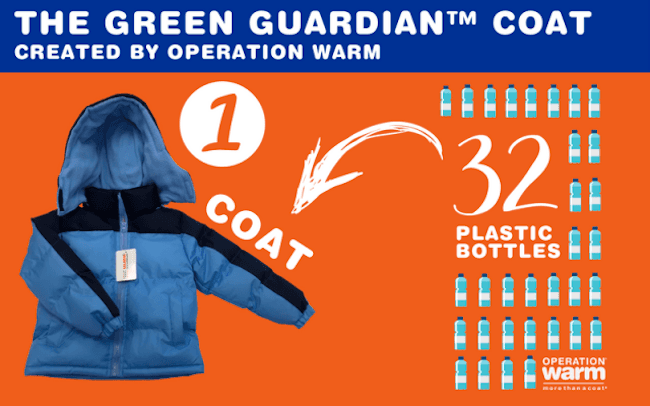
As companies take more steps to make their operations sustainable, they begin holding their suppliers to higher standards. Unfortunately, the green supply chain can still fizzle out when it comes to charitable giving. A simple school supply giveaway, for example, can involve conventional manufacturing, transportation and distribution systems -- and all of the carbon-loaded, resource-draining baggage that comes along with them.
On the plus side, there is a growing movement to provide more sustainable pathwways for corporate giving. The organization Operation Warm is one good example. Since 2002, Operation Warm and its partners have donated more than two million brand new winter coats directly to children in need, and this year it is offering a new green twist: coats made with recycled PET #1 plastic bottles.
A sustainable giving solution
Dubbed "Green Guardian," Operation Warm's new PET coats provide corporate donors with an opportunity to merge sustainable principles with a traditional form of charitable giving.
Triple Pundit was curious what motivated Operation Warm to provide a sustainable alternative to donors, and their communications team provided an answer from Grace Sica, Vice President of Corporate Partnerships:
Operation Warm has a simple mission: we provide children in need a brand new coat. We are committed to continuous innovation around that mission. This year our decision to use recycled PET was driven by the increasing global awareness about the overuse of plastic. Starbucks is eliminating straws, municipalities are banning plastic bags and we are using recycled plastic to make our coats.
Ms. Sica also explained how the use of sustainable materials provides Operation Warm with an opportunity to make an impact far beyond its initial mission:
We believe sustainable principles should be a guiding force in all business and charitable activities. Too often sustainable products are marketed as a niche or high end good. We are in a unique position to make sustainable apparel available to children living in poverty and at low income. These children are going to be so excited to know that they are getting more than a coat. With these coats we are also building future environmental stewards.
Lee Fulton, Director of Strategic Initiatives for Operation Warm, also emphasized how recycled PET broadens the organization's mission:
Sustainability has so many facets that we work to improve. Using [recycled] PET helps us support the UN Sustainable Development goals in several ways. Reducing the use of virgin fibers and preventing plastics pollution are pretty obvious ways that fabrics with recycled content positively effect our contribution to Climate Action, Life Below Water and Life on Land.Less obvious but equally important are Industry Innovation and Responsible Production, which are efforts that we help move forward through our Green Guardian manufacturing.
Charities need supply chain sustainability, too
Operation Warm is somewhat unique in that it does not simply buy off-the-rack items, much less collect used items for distribution.
Instead, the organization is focused on the child's experience of a brand new coat. Anyone familiar with the seasonal rite of gearing up for another winter will recognize the significance of a brand new coat to a growing child, especially if hand-me-downs are the norm.
To achieve that holistic focus on experience, Operation Warm works closely with manufacturing partners to ensure quality control. Children who receive the coats also get to select from a collection of up-to-date colors and patterns.
Now that the Green Guardian option has become part of the experience, Operation Warm could leverage the sustainable giving approach to expand its sustainability initiatives.
So far the organization has focused on its internal operations. For example, Operation Warm has decentralized its distribution system, helping to cut down on carbon emissions (and expenses) related to staff travel. Instead of sending in-house personnel around the country, Operation Warm has amassed a network of more than 800 local partners who manage its distribution events.
Another initiative in the works is the creation of a Volunteer Brigade, which will enlist local volunteers to manage events for coat donors.
As for taking the sustainability message to its corporate partners, there are opportunities in that area, too. Among the organization's supporters are the party goods supplier Unique Industries, the California-centric fashion brand Hollister and the Dunkin' Donuts franchisee Cafua Management Company.
It's also worth noting that another partner, FedEx, has already established itself in the vanguard of carbon action. The company's name is associated with the early adoption of green roofs, electric vehicles and high profile solar installations.
Image: via Operation Warm.

Tina writes frequently for TriplePundit and other websites, with a focus on military, government and corporate sustainability, clean tech research and emerging energy technologies. She is a former Deputy Director of Public Affairs of the New York City Department of Environmental Protection, and author of books and articles on recycling and other conservation themes.














